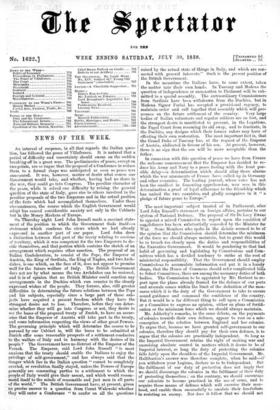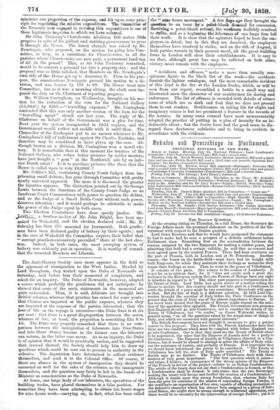The most important subject treated of in Parliament, after Lord
John Russell's statement on foreign affairs, pertains to our system of National Defence. The proposal of Sir De Lacy Evans to appoint a mixed Commission to report upon the condition Of onr4defences has been substantially conceded by the Minister for War. Some Members who spoke in the debate seemed to be of the opinion that the Commission should determine the minimum of the force we should always maintain, but to grant this would be to trench too closely upon the duties and responsibilities of the Executive Government. It would. be pandering to that bad habit of governing and legislating by Commissions and Com- mittees which has a decided tendency to strike at the root of ministerial responsibility. That the Government should employ Commissions to accumulate information and put it in a handy shape, that the House of Commons should refer complicated bills to Select Committees, these are among the necessary duties of both bodies. The Commission to be appointed by Mr. Herbert to re- port upon the plans already framed for the defence of our ports and arsenals comes within the limit of the definition of the mea- sures which it is the duty of the Government to take to ensure sound guidance and command the confidence of the country. But it would be a far different thing to call upon a Commission or a Committee to express an opinion, either on plans of fortifi- cation or the minimum force which we should always maintain.
Mr. Adderley's remarks, in the same debate, on the payments of colonies towards their own defence, appear to rest on a mis- conception of the relation between England and her colonies. To argue that, because we have granted self-government to our colonies, therefore they should pay for their own defence, is to argue that the colonies are practically independent. So long as the Imperial Government retains the right of making war and exercising absolute control in matters which it deems to be of Imperial interest, so long the duty of protecting the colonies falls fairly upon the shoulders of the Imperial Government. Mr. Halliburton's answer was therefore complete, when he said—if you withdraw your Legions, declare us to be Independent. But the fulfilment of our duty of protection does not imply that we should discourage the colonies in the fulfilment of their duty of protecting themselves ; on the contrary, we should encourage our colonists to become practised in the use of arms, and to acquire those means of defence which will exercise their man- hood, and enable them successfully to emulate their forefathers in resisting an enemy. Nor does it follow that we should not
minimize our proportion of the expanse, and hit upon some prin- ciple for regulating the relative expenditure. The Committee s the Treasury now engaged in reviskig this expenditure is one of those legitimate inquiries to which we have -referred.
Sir John Trelawny's Church-rate Abolition Bill makes little progress in spite of his gallant and untiring perseverance to press it through the House. The latest obstacle was raised by Mr. Newdegate, who proposed, on the motion for going into Com- mittee, to levy, as a substitute for Church-rates, in all the parishes where Church-rates are now paid, a permanent land-tax of 2d. in the pound ! This, as Sir John Trelawny remarked, would be to convert a personal tax into a property-tax ; and the proposal was so little relished, that Members on Mr. Newdegate's
own side of the House got up to denounce it. Firm to his pur- pose, the conscientious Newdegate pressed his motion to a di-
vision, and was beaten by 191 to 99. The House went into Committee, but as it was a morning sitting, the clock soon im- posed the duty on the Chairman of reporting progress.
Mr. William Coningham, on Wednesday, brought on his mo- tion for the reduction of the vote for the National Gallery (15,9851.) by 6501.—" travelling expenses." Mr. Coningharn contended that this was only another version of the item for the "travelling agent" struck out last year. The reply of Mr. Gladstone on behalf of the Government was a plea for time. Next year the system inaugurated in 1855 expires, and the Government would rather not meddle with it until then. The Chancellor of the Exchequer put in no answer whatever to Mr. Coningham's bill of indictment against Sir Charles Eastlake, and therefore may be considered to have given up the case. Al- though beaten on a division, Mr. Coningham won a moral vic- tory. It is remarkable that at this moment the trustees of the National Gallery, who refuse better pictures by nobler masters, have just bought a " gem " at the Northwick sale by an infe- rior Dutch artist ! Is it to purchase pictures like these that the House is called upon to vote 10,0001.?
Mr. Collier's bill, restraining County Court Judges from im- prisoning small debtors, has gone through Committee with pretty nearly universal approval. The more it is discussed the greater the injustice appears. The distinction pointed out by Sir George Lewis between the functions of the County Court Judge as an Insolvent Court Commissioner with power to question the debtor, and as the Judge of a Small Debts Court without such power, deserves attention ; and it would perhaps be advisable to make the power of the Judge equal in both cases. Two Election Committees have done speedy justice. Mr. 410eadisi-, a brother-in-law of Mr. John Bright, has been un- seated for Wakefield, and the election declared void ; Mr. E. Behenley has been :112.0 nnseateci. for Dartmouth. Both gentle- men have been declared guilty of bribery by their agents ; and in the ease of Wakefield the Committee express their belief that corrupt practices extensively prevailed" there at the last elec- tion. Indeed, in both cases, the most sweeping system of bribery was evidently put in operation. It is worthy of remark that the unseated Members are Liberals.



























